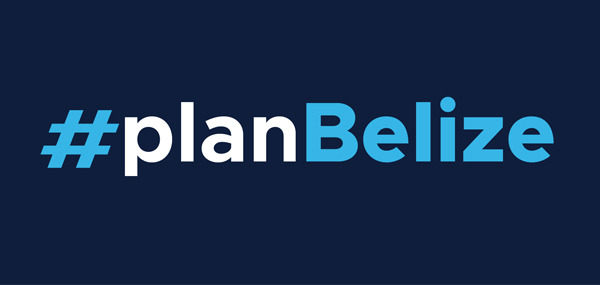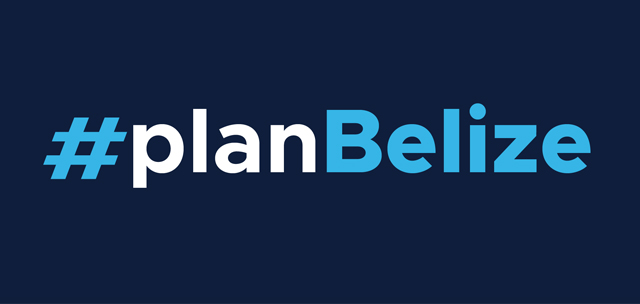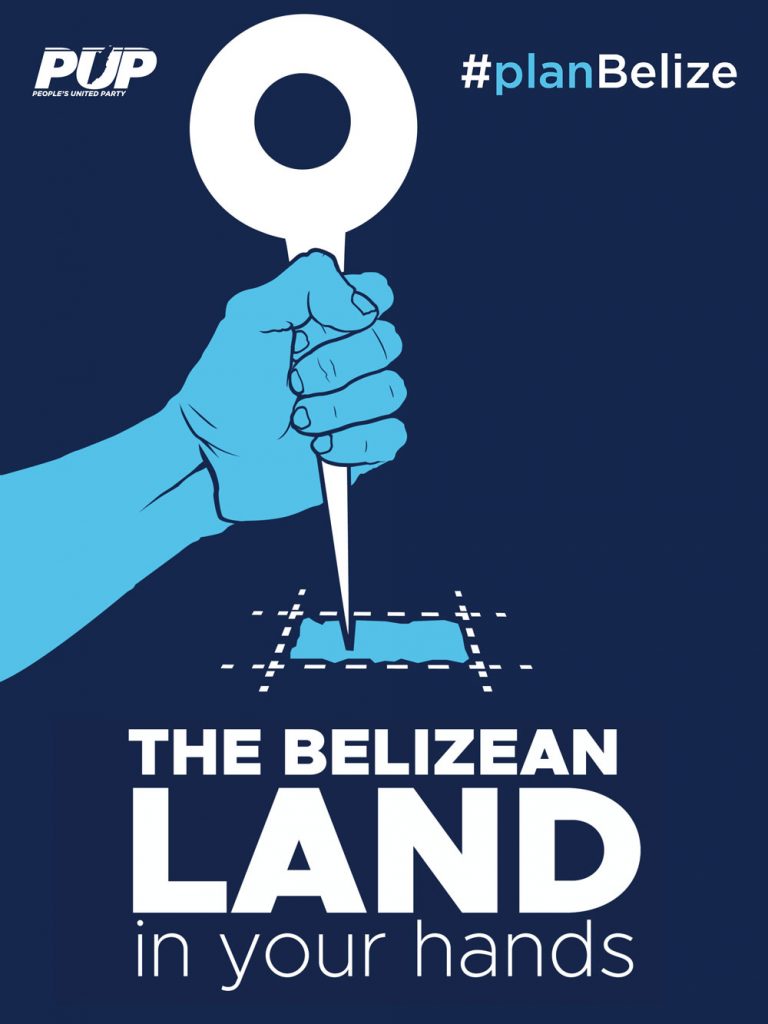LAND
POLICY PAPER
PEOPLE’S UNITED PARTY
This time
must be different
There are some historical wrongs that we do not like to discuss in this country. But nearly half a century ago, in 1974, 3% of landowners owned 95% of the privately owned land in this country, while 91% of the landowners owned a mere 1%. In that year foreigners, mostly US citizens, owned 90% of the privately owned land in Belize. There is a good chance it has not gotten better over time. In fact, some would say it has gotten worse. All over Central America, land concentration in the hands of a few has been the cause of bloody civil wars and mass casualties. That has not been the case in Belize.
What we need to do at this point in our nation’s history, as we seek to make the promise of Independence real, is correct those historical wrongs. We do so not by expropriating land or violent land grabs. We do so by ensuring that all those who do not have land get a piece of the Jewel. We do so by empowering the massively underprivileged and landless in our society. We do so by ensuring that we change the ethos and character and attitude and values of our fellow Belizeans. And in so doing, we avert ever reaching the point of civil war. We ensure that the demand for land does not crescendo into a violent demand. We ensure that our people become independent rather than dependent – that they become landowners rather than land-watchers. We make the Belizean dream real!
The solution
We believe the solution is doable. In fact, we dare say it is easy. All we need to have is the political will…the commitment…the social justice and fire of the George Price PUP. We do that by ensuring that those who do not have – get. And those who need our help the most obtain the help they deserve. We look after the needy among us. The jobless. The landless. The houseless. The listless. The hopeless. We transform their lives materially and ensure that their descendants are removed from poverty forever. To do otherwise would mean that we are condemning their descendants to uninterrupted generations of poverty. The task at hand is nation building by the many, not the few – for the many, not the few. Under a PUP government, everybody fi win! That is the George Price way! That will be the John Briceño way!
We won’t look back. We won’t bother to retell the horror stories of the past. It’s about the future and how we go from the dark ages to an enlightened era. About ensuring that the youth in our midst become landowners. That sixth form students and teachers and soldiers and police officers and nurses and construction workers and day workers and artists and athletes and bank tellers and women can finally declare that they own a piece of the Jewel! That the minimum wage earners can finally breathe with a living wage and a piece of land.
We will ensure that every Belizean who doesn’t own a piece of land, gets a piece of land. Every Belizean. It is doable. In the last 12 years we have seen select families get thousands of acres of lands. With the acres granted to just a few of those families, we could have ensured that every single Belizean who doesn’t own a piece of land gets a piece of land, whether house lot or farmland. That is the charge of the next PUP administration. That is the call to arms. That will be the giant but noble task of the Lands Department which became disreputable under the UDP but will be re-energized. That will be our core ideology manifested – our reason for existing.
We have approximately 40,000 minimum wage earners – 7,000 teachers. 2,000 Police Officers, 1,500 soldiers, 5,000 sixth form students, less than 1,000 nurses, hundreds of athletes and artists, thousands of construction workers and bank tellers. It can be done. The PUP with John Briceño as Minister of Natural Resources issued more than 60,000 land leases during our 1998-2008 administration. It can be done!
The immediate benefits of providing this fundamental Belizean right to first time landowners are obvious and plenty – an opportunity at a dignified, better standard of living…the upliftment of the more than 50% of our people drowning under the poverty line in our country. But what it also offers us is a unique opportunity to ensure that our people – all our people – eat what they produce and produce what they eat. It is about ensuring that our people in the urban centres have access to a decent sized house lot so they can begin to have backyard gardens of substance.
It is time that our people start producing what we eat and eating what we produce. It is about planting our own food, all about food, about eating healthy. That is what COVID-19 has taught us; that food is like gold.
We must embark on a National Urban Garden program. And we don’t need to reinvent the wheel. Our Cuban friends have a wonderfully efficient and productive model of urban gardens and organic food production. We do this: we live longer; we boost our economy. Save foreign exchange. We become truly independent!
Everywhere in the world there is a movement of people from rural to urban. All the experts predict that in the decades to come the movement will only intensify as rural lands are gobbled up by big agri-business. In Belize, we will reverse that urban march. We will honour the rural way of life; we will empower our people.
We will ensure they have family farmland, access to the best lands – the most fertile and accessible land.
There will be land for first time landowners, and land for agriculture production and village expansion.
We will respect the village councils and their lots committees.
We will ensure there is land tenure, so no future government can reverse the land reform we are undertaking.
We will ensure that our rural folks and our urban folks who are respectively into farming and urban gardening get the requisite support from our agriculture extension officers. Just giving the land is not enough. We must support the new landowners with capacity building and targeted support. We must help small farmers to succeed. Small farms mean development, less poverty and more food security.
The process for applying for and receiving land must be simple, transparent and uniform. It must be non-partisan, friendly and convenient. No more letters from Ministers to apply for land. The criteria will be simple: if you are a first-time landowner you can apply. There will be no more partisan distribution of land. Land distribution will be based on need.
What is good for the landless is good for the party; it cannot be that what is good for the party is bad for the landless.
There will be no more middlemen at the Lands Department; no more paying for a public service you have already paid for.
There will be no more up and down to Belmopan for rural and even town and city folks. We are living in a modern era; central government should be going to the people, not the other way around.
The digitization of the Lands Department should mean more transparent management of national lands, but also more convenient and friendly service to our people wherever they are in the country.
We must hire a cadre of surveyors at the Lands Department. It is about making land available to the needy at the lowest cost. It’s been 25 years of acknowledging that an egregious mistake was made with the retrenchment of surveyors yet we’ve done nothing to correct it. We must reduce the cost of land distribution.
Right land, right start
We must ensure we do a comprehensive survey of all available national lands in this country and prioritize national development. Our small farmers will be top priority.
We cannot be subdividing the best agriculture land for non-agriculture purposes, or trying to plant on land more suitable for houses, or allocating the worst agriculture land to the poorest persons.
We must ensure that our first-time landowners get the right land! That is, that the poor get land that is appropriately sited, arable, and easy to access.
We must make sure that the landless get land that needs the least investment to produce. We cannot set up our people to fail; we must put them in a position to succeed.
Conserving while producing
Land is a finite resource, so it must be managed in a sustainable, accountable and equitable way.
Our land use must be environmentally sound and socially responsible, especially in this age of climate change and runaway weather conditions.
This land was not given to us by our ancestors; it was loaned to us by our children.
We must ensure we tend it in a way that ensures it lasts for many generations to come.
We must practice climate smart agriculture ala Ya’axche Conservation Trust. They conserve while producing and produce while conserving.
We must make the resources work for the people in the surrounding communities. You cannot have people looking at Christmas but not being able to enjoy it, while poachers and plunderers come from afar and reap.
Conservation management has to include people and not just be about nature.
The Forestry Department has to be properly staffed and funded to properly protect the reserves, the bountiful natural resources of this country – both from within and without. More government presence is needed to thwart the encroachers.
Statutory protected areas and forest reserves are not to be de-reserved unless clear and unequivocal public benefit is established.
We can and must practice smart agriculture that maintains our forest cover. We cannot continue to indiscriminately scrape off hundreds of acres of land, leaving ourselves vulnerable to flooding and droughts and deterioration of soils and land productivity. We can learn from our farmers in the far south.
We should have more model farms in the South to dissuade farmers from the terribly debilitating slash and burn techniques.
Loss of natural vegetation cover is due to ill-sited land use and can have a severe impact on wildlife and landscape values.
We must promote an aggressive reforestation program, complete with mangrove replanting.
Proper land use is critical to mitigate the potential impacts of climate change; it is essential for life.
We cannot divorce the environment and development; they must be married and remain married.
We must protect land with “high intrinsic value,” those lands that provide watershed protection, important botanic and wildlife habitat, tremendous biodiversity and cultural significance.
We must do all to protect our waterways and watersheds. Water is an increasingly scarce commodity all over the world and region. We must be maniacal about our water. Water is a human right. The reservation of critical water catchment areas is a must.
Our economy has traditionally been underpinned by our natural resources; with tourism, agriculture, aquaculture and fisheries, energy, electricity and water being largely natural resources based.
And while that alone demands that we do all we can to equitably, transparently and sustainably manage our bountiful blessings, there are options to further capitalize our natural resource stock.
We should aggressively pursue debt for nature swaps that would ease debt service obligations and allow us to use those monies to meet our social and environmental targets.
We should also look more carefully at accessing Green Climate Funds via partnerships with institutions like The Caribbean Community Climate Change Centre (5Cs). We can potentially access millions of dollars to address our social and environmental needs in reducing vulnerability to climate change and other disturbances.
We have approximately 40% of our land and 23% of our national territory under protected status. We can take advantage of carbon offsets and biodiversity offset programs internationally which traditionally have only been accessed by those in the conservation community.
Consultation, consultation, consultation
We will consult on land use across the country. We will not seek to impose our will on communities with no regard for what the communities think are best for them.
We will foster a spirit of mutual respect as we dialogue to achieve best practices in and around our country.
We recognize that communal land rights will ensure that ancestral lands are never alienated in the hands of a few.
Our interaction with the communal land activists will be one based on trust and respect. We must see ourselves as an integral part of Belize, and as equal partners, in this drive to uplifting the dignity and rights of all Belizeans.
The intangible benefit of land ownership and home ownership cannot be overstated. It is about the transformation of a people out of the wilderness and into the promised land envisioned by our founding fathers.
It is about lifting people out of poverty in a way that is inclusive and demonstrative.
It is about future generations being able to look back and say that this generation of leaders dared to be different, dared to stand up for those among us who were traditionally left behind, that we sought to level the playing field, that we sought to make us all equal as we are in the eyes of God.
There is nothing false about hope. This will inspire hopes and dreams and aspirations beyond anything we have ever seen.
There is nothing false about saying we are fast reaching a point of no return.
Some will say it is impossible and we should not try. But we cannot afford not to try. I say there is nothing impossible about this when the Belizean people in one voice all over this land say this is what they want!
Everybody fi win!
KEY PLEDGES
- Ensure that every Belizean who doesn’t own a piece of land, gets a piece of land. Every Belizean.
- Prioritize the right of first-time landownership for women and young families
- Ensure Belizeans have access to fertile farmland - the most fertile and accessible
- Embark on a National Urban Garden program so that people in the urban centres get decent sized house lots to have backyard gardens
- Underscore our land policy with a philosophy that there will be land for first time landowners, and land for agriculture production and village expansion
- Respect the village councils and their lots committees
- Guarantee land tenure, so no future government can reverse the land reform we implement
- Respect communal land rights to ancestral lands
- Facilitate support from our agriculture extension officers for rural and urban farming and urban gardening
- Recognize that just giving the land is not enough. We must support the new landowners with capacity building and targeted support. We must help small farmers to succeed. Small farms mean development, less poverty and more food security
- Simplify the process of applying for and receiving land titles, and ensure transparency
- Digitize the Lands Department to ensure non-partisan, efficient and convenient distribution of lands and other services
- Re-establish the survey department
- Promote land use that is environmentally sound and socially responsible especially in this age of climate change and unprecedented weather conditions
- Promote an aggressive reforestation program including mangrove replanting
- Protect land with “high intrinsic value,” - lands that provide watershed protection, important botanic and wildlife habitat, tremendous biodiversity and cultural significance
- Strategically access Green Climate Funds via partnerships with institutions like The Caribbean Community Climate Change Centre (5Cs) to secure millions to address our social and environmental needs, reduce vulnerability to climate change and other risks



